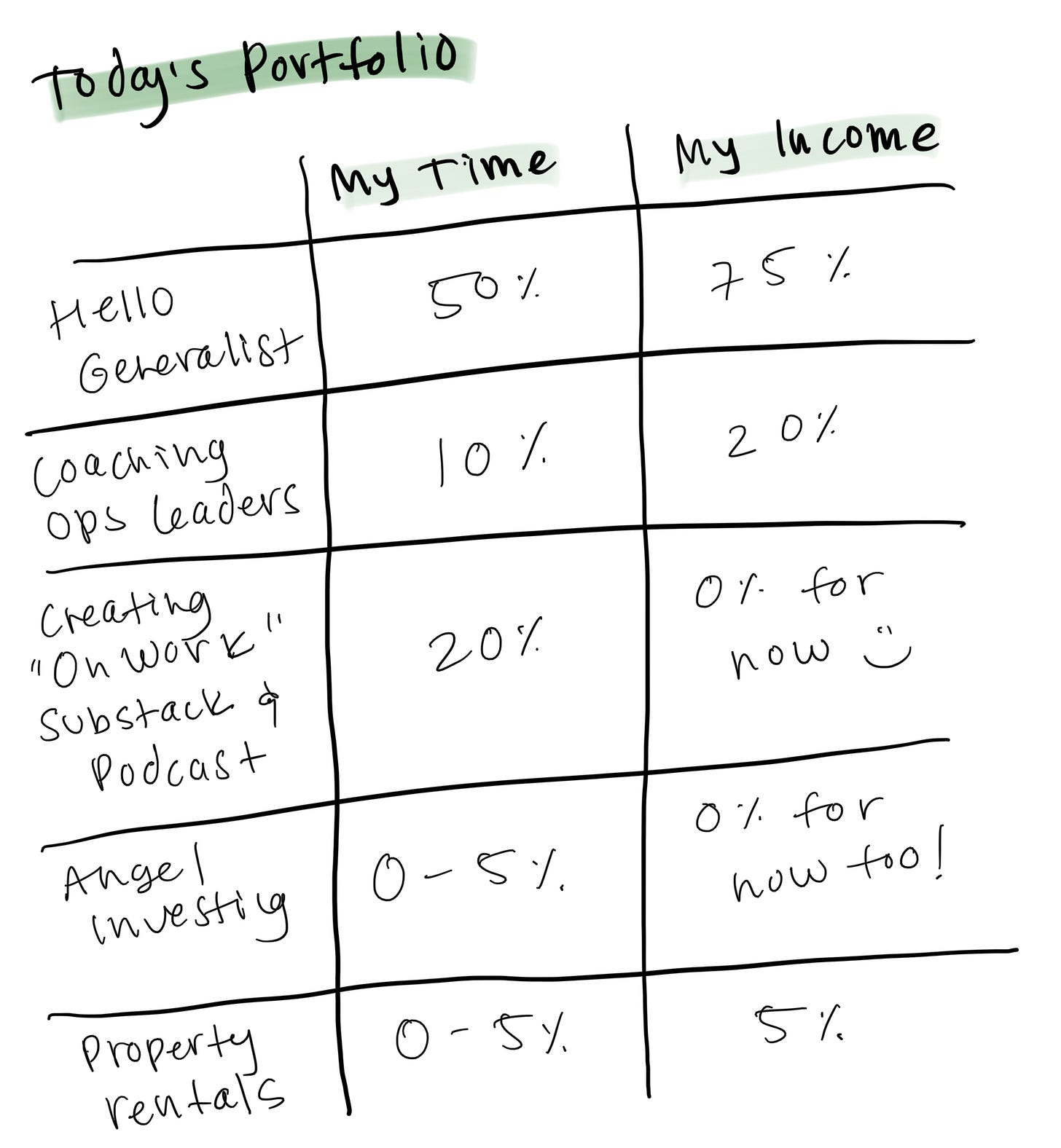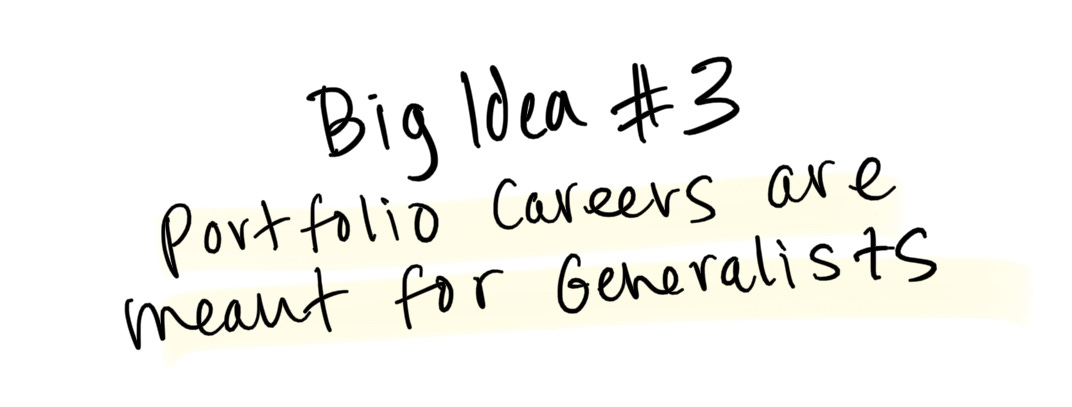Big Idea #3: Portfolio Careers are meant for Generalists
How your smartest friends are building leveraged income streams
Welcome back to part 4 of this 4 part series on the big ideas shaping Hello Generalist, and what I think is going on in *gestures wildly* this phase of work. Get caught up on the first 3 parts here: the intro, Big Idea #1: the Rise of Fractional Work, and Big Idea #2: The High Value Generalist.
This 4-parter was my personal accountability buddy in getting back into writing. Did I stop procrastinating and find a healthy weekly writing schedule? lol, no. But did I get these 4 issues out the door and resembling something I’m somewhat proud of?! Yes! I did! More, it’s clear that the conversations that come after I hit publish are more than worth the effort. Keep reaching out to say hey.
Before we drop into today’s issue, some shameless plugs. If you’re into the ideas I write on, here’s a few ways for us to work together:
Are you a startup who’s curious about fractional hiring? Check out Hello Generalist, or book a call with me here.
Are you a startup operations pro who wants to join HG’s network of fractional operators? We’re on a waitlist at the moment, but welcome your application.
Want 1:1 time with me to talk about building your fractional work practice or portfolio career? I’ll show up judgement free and candid, and make this hour a super valuable one for you. You can read more and book that here.
Alright, let’s get into it.
What in all good hell is a Portfolio Career?
No, not a stock portfolio, not an art portfolio, not another name for a brief case. A Portfolio Career is a career built on a variety of income streams, where someone applies their range of skills broadly, instead of with one full-time job.
If this is the first time you’re running into the term, I feel I must apologize for adding yet another phrase to the word soup of Gig Workers, Freelancers, Digital Nomads, Creators, and Fractionals and wow could I go on. But also, I do promise that this is unique.
To anchor us a bit, I like Reid Hoffman and Ben Casnocha’s career spectrum from their Startup of You book. Think about it this way:
Laser Careers: You’re devoted to one main thing. You have one job with one source of income that you’ve gone deep on. These are people who work a good ol’ fashioned full time job, or manage one deep effort, as most VC backed startup founders do.
Main Thing Careers: You have a full-time job, call it your Plan A, but then also stack a side hustle as your Plan B. This might look someone who works an intense job during the day, but is writing a book a night, or drives Uber on the weekends, or manages an Airbnb. It’s Main Thing + Side Thing.
True Portfolio Career: 15% here, 23% there, 62% there. A combination of time spent across projects, income streams, and businesses. This lets people explore different interests and ways of working, brings the most income diversity and protection, and might unlock more impact.
One path isn’t better than the other. Any part of this line is great. The point is to be thoughtful about where you want to be on the spectrum, making choices for where your brain and life will most thrive.
I also like the metaphor of a “slash person,” borrowed from Marci Alboher’s great book One Person/Multiple Careers. As a Portfolio Careerist, you’re not defined by one title, you’ve got some slashes in your name. The podcast host / yoga teacher. The Fractional COO / Coach / Writer. The Angel Investor / Airbnb Host / Full-time startup PM.
What makes this different than the Gig Workers from years past? Instead of elevating hustle culture on a bunch of apps or freelance gigs, a Portfolio Careerist embraces the whole self, and reflects a balance of life, passion, money, and skills. The word “hustle” still very much applies though — it takes effort to pull this off, but the resulting lifestyle looks different. I like the way my internet friend and fellow Portfolio Career advocate, Anna, describes it as “a career that sits at the intersection of freedom, creative fulfillment, meaning and money.”
If you’ve been watching smart people on LinkedIn, you’ve definitely seen this:
You might follow Mallory, Mercury’s Head of Community + Founder of OGC + Online course creator, or David, Community Lead of Chief of Staff network + Podcast Host,
Or HG members like Erin (Founder Coach + Fractional COO + Advisor), Kapil (Fractional Comms Lead + YouTube creator), and Elise (Fractional COS + COS Coach and Community Leader),
Or perhaps you already follow Portfolio Career proponents like Brie and Anna
They’re all building Portfolio Careers: a mix of income sources and loving attention spent on projects that let them share their gifts outside the traditional full-time job.
There’s a few key reasons why this is a thing right now. Most you likely intrinsically understand:
The full-time job market, especially in tech, is unpredictable and unreliable: It seems silly to think that you can rely on one full-time job for financial sustainability and emotional wellbeing in the world.
The internet makes starting and promoting new projects really easy.
Remote work lets us spend our time nonlinearly each day.
And the Creator Economy has made it’s way to the business world, laying the path for us to build paid courses, fund podcasts, get paid for writing, or build and sell mini products. It seems pretty obvious that a new approach would rise up.
My own portfolio journey
I’ve lead two Portfolio Career chapters in my life.
The first was chaotic. In my early 20s, I had dropped out of college to help start a food truck and CPG company, and cobbled together rent and beer money each month thanks to a part-time job at Anthropologie, and working for a local arts nonprofit.
The hustle was a blast, and I see very clearly how it lead me to my current chapter. But it was a bit haywire as none of the three jobs enabled the other. There was no leverage when I combined them. It was survival mode.
Compare that to my Portfolio today, where I’m working to capitalize on the depth and expertise in operations, fractional work, and startups. The Portfolio is leveraged, with all but one stream enabling and supporting the others. I have a vision for how these things scale in harmony, letting me explore different mediums, skills, and channels.

What changed? In between my early 20s and now, I built expertise in a few areas, namely in startup operations and fractional work. I also had a few standout career experiences inside Yelp and Chewse that I stand on now to build credibility. I’ve taken those skills, and now apply them across mediums to maximize the exposure, and maximize my income.
So what changed? I went from Early Career Dabbler to High Value Generalist, and now get to build my life in a way that’s uniquely for me.
High Value Portfolio Careers are meant for High Value Generalists
As I started Hello Generalist, my goal was to bring together startup fractional leaders: people who had built their careers inside high growth startups, and now want to work independently. But as I met with our members, I realized that for most, fractional work was one piece of how they envisioned this chapter of their career. Many wanted a portfolio.
HG members are approaching their portfolio like I am: they’re leaning on the credibility and depth they built in their full-time jobs, expanding it now across channels and mediums. There’s synergy (sorry) to what they’re building.
Reid and Ben refer to these people as having High Value Portfolio Careers — a nice spin on the High Value Generalist from our Big Idea 2. Put simply, it’s a super leveraged portfolio with potential big pay off, both financially and in impact.
Reid Hoffman himself is another great example: Reid was first established as a designer and engineer, then joined the infamous Paypal Mafia, then founded LinkedIn. Today, he hosts a podcast, publishes books and writes online, is an investor, and gets involved in social and political work to make the world better. Make no mistake: Reid is a High Value Generalist who’s High Value Portfolio uses all of his skills and interests.
To pull this off, you need the range of skills and confidence from scrappy beginnings, the credibility of becoming a High Value Generalist, and the hustle to bring it all together.
To build on my sketch above, this whole thing is only enabled (it’s hugged!) by my classic generalist skills, like connecting the dots, experimentation in new domains, a brain that loves trying new things out. I don’t think I could do this without those skills. The dabbling and exploration are not just familiar, they’re key to who I am.
Portfolio Careers are meant for Generalists.
If you want to go deeper into the ideas from today’s post, here’s a glimpse into what I’ve been reading, watching, and listing to this week.
Reid Hoffman and Ben Casnocha do a wonderful deep dive on their Startup of You Podcast episode on this exact topic. Check it!
Hello Generalist member Brie hosts The Portfolio Career Lab, an excellent podcast and great newsletter to subscribe to. I love the episodes with Jori and Janel in particular.
Written in 2012, Marci Alboher’s One Person/Multiple Careers (the one behind “slash careers”) is the OG.
Christina Wallace’s new book The Portfolio Life explores this further. She’s brilliant and fascinating, working as an author and Senior Lecturer at Harvard, and having past lives as a startup Founder, podcast host, and 3x Tony nominated broadway producer.
If you’re looking for a coach, Julie and Anna offer great looking coaching programs to help you build your portfolio.
Be well! Until next week, Shaina












Wow, thank you for writing this. You've summarized what I've been struggling to define for the past 20+ years. Everything makes sense now, and confirms that my next career plans are not totally stupid.
Your content resonates with me bigtime. Early in my career, I was told you need to specialize - find a job, an industry and spend all your time learning about it...get deep and be an expert.....I thought, how f-ing boring is that! I rebelled and have been successful on the sales and marketing side for many different industries and now that AI is here to stay, the creative class (coined by Richard Florida - great reading) will take over IMHO.